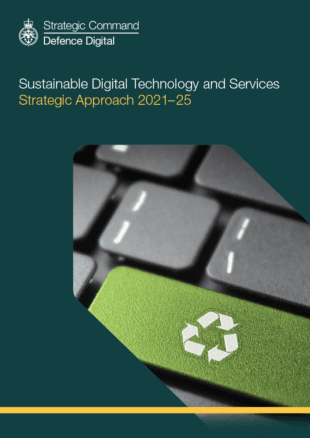Even end-of-use Information Technology (IT) has a hidden value that organisations may not have considered, and it’s good for the environment too.
One element of the Government’s approach to digital sustainability is to move towards a circular economy, where product life is maximised through re-use and re-manufacture. The cost of remanufacturing is about a third of the price of a new device but delivers up to 97% of the performance of the latest models. Cascading end-of-use devices reduces manufacturing needs, a process that emits 50 times the annual CO2 emissions of operating existing equipment. Furthermore, extending the life of existing IT equipment also contributes towards supply chain resilience.

Defence Digital recently published the Sustainable Digital Technology and Services Strategic Approach 2021-2025 for Defence, outlining how Defence’s digital ambition can be realised in a way that achieves the UK Government’s priorities for climate change and sustainability.
Defence Digital has already taken initial steps towards embedding circular economy principles into its work by cascading end-of-use devices to users with unfulfilled ICT needs, as the examples below demonstrate.
Supporting Army Cyber Spartan
More than 400 personnel took part in Army Cyber Spartan, the largest defensive cyber competition undertaken by the British military. To support the exercise, Defence Digital provided 100 previously used workstations for use as access devices and sourced a number of remanufactured laptops from commercial sources.

Educating Cadets
Other beneficiaries of re-used and upgraded devices include cadet units.
At Gwent and Powys Army Cadet Force, where many cadets don’t have regular access to Information Technology, cadets have enjoyed being able to use laptops provided by Defence Digital to log evidence in support of their Duke of Edinburgh’s Award.
Moreover, at 2002 (Kingswood) Squadron Air Cadets, the provision of personal computers resulted in a two-fold increase in the number of cadets passing their cadet classification examinations.
Developing these initiatives further will help Defence to improve outputs, to save money and to reduce its carbon footprint, helping us to achieve the Government’s 2050 Net Zero goal.
2 comments
Comment by Simon posted on
That's all well and good - but the examples given are of "mostly up to date but used" equipment. In the IT world, things move quickly, and some vendors seem to have a policy of obsoleting working hardware via the back door. Examples :
I have an original iPad, it still functions perfectly well, but Apple chose to implement it's support functions (i.e. the App store) so that anything that can't run the latest versions of apps can't have apps added. There's no feature to show only versions of apps that will actually run on the device, and it appears that as an app is updated, older versions disappear. To add insult to injury, during some unknown system update on my laptop, Apple removed the ability to transfer files (pictures, videos) over USB (I used to load it up with videos to watch while travelling). As a result, a device which still functions perfectly has been reduced to a paperweight.
Similarly, many software vendors only provide the latest versions of software to download. As my personal IT is now rather aged, and running an old version of OS X, I have to seek and find older versions of software to download - sometimes easy, sometimes downright difficult. To add insult to injury, I have one piece of software which automatically updates itself (no option to turn that off) to the latest version which doesn't work - so every time I use it, I have to re-install the older version first.
A more pernicious situation is where a product won't function without some service run by the vendor - meaning that the vendor can obsolete a whole class of devices simply by turning off the service or having it reject older devices. Zune and Revolv owners would be familiar with this.
So I would argue that the examples given aren't all that special - they are just using newish hardware for a bit longer before throwing it away.
At a previous job I got to do all sorts of things using just the servers that my Windows using colleagues were retiring. I did this by running software with less of the issues described (GNU/Linux and various FOSS packages). As some of this hardware had originally been bought in pre-owned, mine was typically the third (or in some cases, fourth) life for the equipment.
Comment by Rebecca Carden posted on
Response from the blog author, Grant Morley:
Thank you for your observations Simon. You highlight a key issue for the circular economy; both hardware manufacturers and software developers have a vested interest in selling more rather than reusing. Many of the improvements are of course invaluable, particularly when they relate to security, but I think we all agree that there needs to be more consideration of sustainability in their approach. The government has recently legislated on the right to repair for some goods, and we hope that ICT suppliers will take note. There is also international collaboration taking place on buying standards to include the ability to recycle and remanufacture ICT which we hope will drive changed behaviours in OEMs. And of course the general public can support this by using their devices for longer, giving manufacturers and suppliers an incentive to offer device upgrade services rather than encouraging device replacement.
The examples shown in the blog represented the first steps in developing a device cascading process for the MOD, much as you did with your 3rd and 4th life equipment. Cascading is an integral part of the circular economy and is described in BS 8001:2017. We want to supplement this internal process by the provision of commercially-available upgrade and remanufacture services so that devices remain in use for 8-10 years rather than 4-5 years. Cascading devices from high-end users to less resource-intensive functions has considerable potential, not only within MOD but across government and externally - for example the provision of laptops to digitally-disadvantaged families for educational purposes during the pandemic.
I hope this provides assurance that we fully intend to adopt the circular economy to promote real change in the industry.